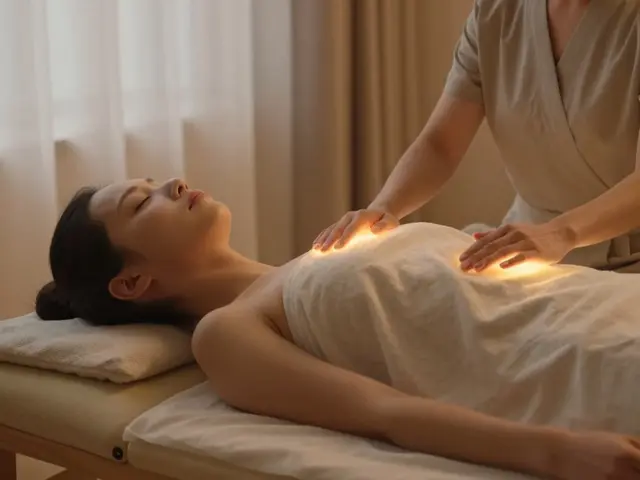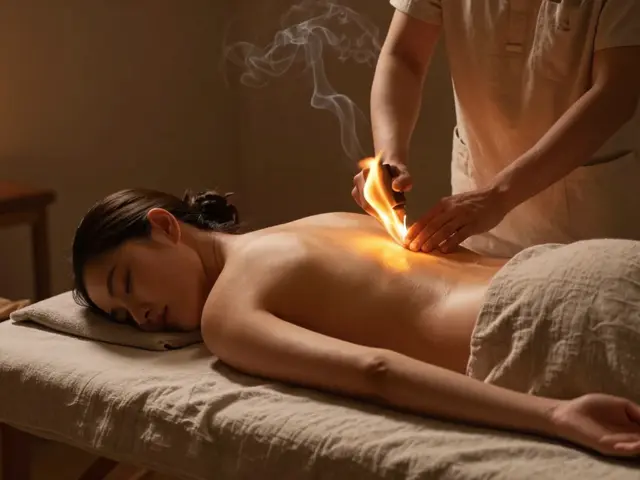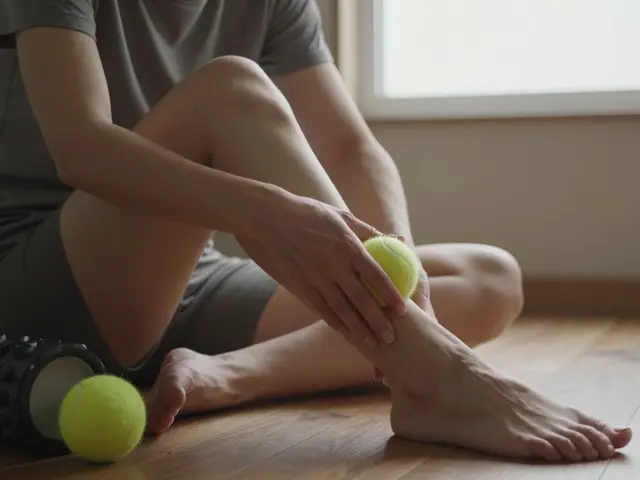Expecting a little one can be both exciting and overwhelming. Your body undergoes many changes, and sometimes you just need a good way to unwind. That's where prenatal massage comes in. This specialized massage is designed just for pregnant women, offering a blend of relaxation and therapeutic benefits.
When done properly, prenatal massage can alleviate back pain, improve sleep, and even reduce stress. It's all about focusing on the areas of your body that could use some extra care during pregnancy.
- What is Prenatal Massage?
- Benefits of Prenatal Massage
- Safety Tips for Prenatal Massage
- How to Choose a Therapist
- DIY Massage Techniques
What is Prenatal Massage?
Prenatal massage is a specialized form of therapeutic bodywork designed to support the unique needs of pregnant women. This type of massage aims to alleviate the common discomforts associated with pregnancy, such as back pain, swollen ankles, and aching joints. Unlike regular massages, prenatal massages involve techniques and positioning tailored to be safe and effective for expectant mothers. The massage therapist uses gentle pressure to help relax the muscles, improve circulation, and reduce stress levels, making it an excellent way to pamper yourself during pregnancy.
One of the key aspects of prenatal massage is its focus on specific areas that experience the most strain during pregnancy. This includes the lower back and hips, which bear the extra weight of the growing baby, and the legs, which can swell due to increased blood volume. During a session, mothers-to-be typically lie on their sides or use specially designed pillows to ensure comfort and safety. Aromatherapy may also be incorporated to enhance relaxation, though it's important to use pregnancy-safe essential oils.
According to the American Pregnancy Association, prenatal massage has been shown to reduce levels of the stress hormone cortisol, while increasing levels of serotonin and dopamine — the body's natural feel-good chemicals. This can result in improved mood and reduced anxiety, contributing to a healthier pregnancy overall. It's not just about the immediate relief but also the long-term benefits to maternal health.
“Prenatal massage therapy can mitigate stress, anxiety, and depression, and could play an important role in prenatal care,” says Carole Osborne, a renowned expert in prenatal massage. “It helps in preparing the body for labor and supports the hormonal transitions of pregnancy.”
Safety is paramount in prenatal massage, making it crucial to find a certified massage therapist who has specific training in this area. They understand the dos and don'ts, such as avoiding certain pressure points that could trigger contractions and ensuring the mom's comfort throughout the session. Listening to your body and communicating with your therapist can make the experience both safe and highly beneficial.
For those contemplating this blissful way of pampering, it's worth noting that some studies suggest regular prenatal massage can potentially lead to shorter and less complicated labors, by promoting better overall muscle tone and flexibility, especially in the muscles used during childbirth. While these claims could vary among individuals, the plethora of emotional and physical benefits suggest that prenatal massage is a worthwhile consideration for many expectant moms.
Benefits of Prenatal Massage
One of the significant benefits of prenatal massage is the relief it offers from common physical discomforts during pregnancy. Many expectant mothers experience back pain due to the added weight and shifting center of gravity. Prenatal massage targets these problem areas specifically, helping to alleviate pressure on the lower back and shoulders. This can make a huge difference in your day-to-day comfort.
Another fantastic benefit is the potential to improve sleep quality. With pregnancy comes a host of sleep issues, including insomnia and restless nights. Regular massages promote relaxation, reduce muscle tension, and can contribute to a deeper, more restful sleep. Imagine getting that rare, uninterrupted sleep you crave so much; prenatal massage can be part of the solution.
Stress reduction is another key advantage. Pregnancy can be a stressful period filled with various physical and emotional changes. By stimulating the production of endorphins, prenatal massage can help to lift your mood and decrease stress levels. This hormonal balance is essential not just for your well-being but also for your baby’s development. A consistent massage routine can improve your body's ability to cope with stress, making this a valuable tool for mental health during pregnancy.
Blood circulation is another area where prenatal massage shines. Improved circulation can reduce swelling in the hands and feet, a common issue many women face while pregnant. By applying gentle pressure, massage promotes blood flow and helps in eliminating toxins from the body. Improved circulation can also enhance nutrient and oxygen delivery to both you and your baby, facilitating better overall health.
Additionally, prenatal massage may aid in hormone regulation. The therapy can help stabilize levels of hormones like norepinephrine, cortisol, and serotonin. This can result in fewer mood swings and a more positive outlook throughout your pregnancy journey. An article published in the Journal of Psychosomatic Obstetrics & Gynecology highlights the numerous anti-anxiety benefits of prenatal massage.
“Pregnant women who received regular massage therapy reported significantly lower levels of anxiety and depression.” – Journal of Psychosomatic Obstetrics & Gynecology
Swelling, or edema, is another issue that prenatal massages effectively address. This swelling often occurs in the joints during pregnancy and can be quite uncomfortable. By improving circulation and lymphatic drainage, massage can help reduce this swelling, making it easier to move and feel comfortable.
Finally, prenatal massage offers a unique bonding experience for you and your baby. During a massage, the body releases oxytocin, also known as the

Safety Tips for Prenatal Massage
Prenatal massage is not just about relaxation; it’s also about ensuring the safety and well-being of both mother and baby. Here are some essential tips to keep in mind when planning for a prenatal massage.
First, always consult your healthcare provider before scheduling a massage. It's crucial to ensure that getting a massage is safe for your specific pregnancy. Some conditions, like severe preeclampsia or high-risk pregnancy, might mean massage isn't the best option for you.
It's equally important to choose a massage therapist with specialized training in prenatal massage. This ensures they understand the unique needs and potential risks associated with massaging an expectant mother. Look for certifications or professional licenses that confirm their expertise. The American Pregnancy Association recommends seeking therapists who have completed courses designed specifically for prenatal care.
The right positioning is key. After the first trimester, it’s typically advised to avoid lying flat on your back during the massage because it could put undue pressure on blood vessels and hinder circulation. Side-lying positions with supportive pillows are generally recommended. This keeps the body comfortable and reduces any risk to the baby.
Pay attention to the pressure applied during the massage. While a firm touch can feel good, overly deep pressure, particularly on certain areas like the ankles, wrists, and the lower back, can trigger contractions or discomfort. A gentle, soothing approach is best, focusing on relieving tension without causing any strain.
According to Dr. Denise Jagroo, a women’s health physical therapist, “Understanding how to modify techniques for the pregnant body can make a significant difference in both comfort and safety.”
Relaxation during pregnancy often extends beyond the physical aspects of a massage. It’s essential to maintain an open dialogue with your therapist, communicating any discomfort or concerns as they arise. This helps in making real-time adjustments ensuring a positive experience.
Things to Avoid
There are a few places to avoid during a prenatal massage. Reflexology points, notably those around the ankles, can inadvertently stimulate labor. It’s a good idea to instruct your therapist to steer clear of these areas. Additionally, avoid essential oils unless approved by your healthcare provider, as some can have adverse effects during pregnancy.
Hydration is often overlooked but quite crucial. Make sure to drink plenty of water before and after your session to help flush out any toxins released during the massage. This simple step can help further alleviate any minor post-massage discomfort.
Special Considerations
Not every massage studio may be equipped to handle the specific needs of prenatal clients. Make sure the facility has proper accommodations and equipment suitable for pregnant women, such as adjustable tables and ample pillows for support.
Lastly, always trust your instincts. If something feels off or uncomfortable, don't hesitate to speak up or even stop the session if needed. Your comfort and safety are the ultimate priorities during a prenatal massage.
By following these tips, you can ensure that your prenatal massage is a safe, soothing, and positively memorable experience.
How to Choose a Therapist
Finding the right therapist for your prenatal massage can make a big difference in your pregnancy experience. First, it's crucial to seek someone who is trained specifically in prenatal massage. A qualified therapist will know how to adjust the techniques to ensure both your comfort and safety. You don't want someone untrained in this specialized field working on your pregnant body, as improper techniques can be harmful.
Next, consider the therapist's experience. Ask how long they've been practicing and how many pregnant clients they've worked with. A therapist who has worked with many expectant mothers will have a better understanding of the unique needs and challenges that come with pregnancy. They should know how to position you safely and use techniques that address common pregnancy issues like back pain and swelling.
Another factor to consider is comfort. You should feel at ease with the therapist and their clinic. A good therapist will take the time to understand your specific needs and answer any questions you might have. Don't be afraid to request a consultation or initial meeting to see if it feels like a good fit. During this meeting, discuss any medical conditions or concerns you might have, so the therapist can tailor the massage to your needs.
Check for certifications and affiliations as well. Many professional organizations, like the American Massage Therapy Association, offer certifications for those trained in prenatal massage. Being a member of such an organization can be an indicator of the therapist's professionalism and commitment to continuing education.
One useful tip is to look for reviews or testimonials. Many clients share their experiences online, which can give you insight into what to expect. Positive feedback about the therapist's skill, professionalism, and ability to provide a relaxing experience can help you make a more informed decision.
You may also want to inquire about the massage environment. The setting should be clean, comfortable, and conducive to relaxation. This environment plays a big role in how effective the massage will be. The right lighting, soothing music, and a comfortable massage table can significantly enhance your experience.
Insurance coverage is another point to consider. Some insurers cover prenatal massages, especially if they are deemed medically necessary. Check with your insurance provider and the therapist to see if this is an option for you. This can greatly reduce out-of-pocket costs and make regular massages more affordable.
“A prenatal massage, when done correctly, can be a wonderful way to relieve the physical stresses and strains of pregnancy. It’s important to choose a therapist who understands the unique needs of expectant mothers,” says Dr. Sarah Johnson, a renowned obstetrician.
If you're part of a maternity group or community, ask for recommendations. Often, word of mouth from trusted friends can lead you to great therapists you might not find through other searches. Personal recommendations are often invaluable, as they come from firsthand experience.
Ultimately, choosing the right therapist for your pregnancy pampering is about finding someone skilled, experienced, and able to provide a safe, comfortable experience tailored to your needs. With the right therapist, prenatal massage can become a cherished part of your pregnancy journey.

DIY Massage Techniques
Being pregnant means you're always on the lookout for ways to feel more comfortable, and learning some DIY prenatal massage techniques can be incredibly useful. These self-massage methods help ease tension and soothe sore muscles, all while giving you the flexibility to do it when and where you need it.
One of the most effective and simple techniques is the tennis ball massage. Place a tennis ball between your back and a wall. Gently lean into the wall and move your body up and down, letting the tennis ball massage the muscles along your spine. This can be especially helpful for alleviating lower back pain, a common issue during pregnancy.
Foot massages are another wonderful way to pamper yourself. Sit in a comfortable chair and use a small ball, such as a golf ball, to roll under the arches of your feet. Apply gentle pressure and move the ball in circular motions. This not only feels great but can also help reduce the swelling in your feet that often accompanies pregnancy.
For a calming abdominal massage, lie down on your side with a pillow between your knees. Use gentle, circular motions with your fingertips to massage your belly. This can be relaxing and potentially help with digestion issues that some expectant mothers face. Make sure to use light pressure and avoid any areas that feel uncomfortable.
Another technique involves using your hands to massage your shoulders and neck. Sit upright and place your left hand on your right shoulder. Gently squeeze the muscle and release. Move your hand up and down your shoulder and neck area, repeating the motion on your left side with your right hand. This can help relieve tension, a common issue due to the additional weight and posture changes during pregnancy.
If you're looking for a soothing way to unwind before bed, consider a scalp massage. Use your fingertips to gently massage your scalp in small circles. This can help reduce stress and promote better sleep, which is crucial during pregnancy. You can even add a few drops of lavender oil to enhance the calming effect.
According to a study published in the Journal of Nursing Education and Practice, self-massage can significantly reduce stress levels in pregnant women, making it a valuable tool for expectant mothers.
Always remember to listen to your body. If any of these techniques cause discomfort, stop immediately and consult with your healthcare provider. With consistent practice, these DIY prenatal massage techniques can become a wonderful addition to your pregnancy care routine, helping you to relax and enjoy this special time.










